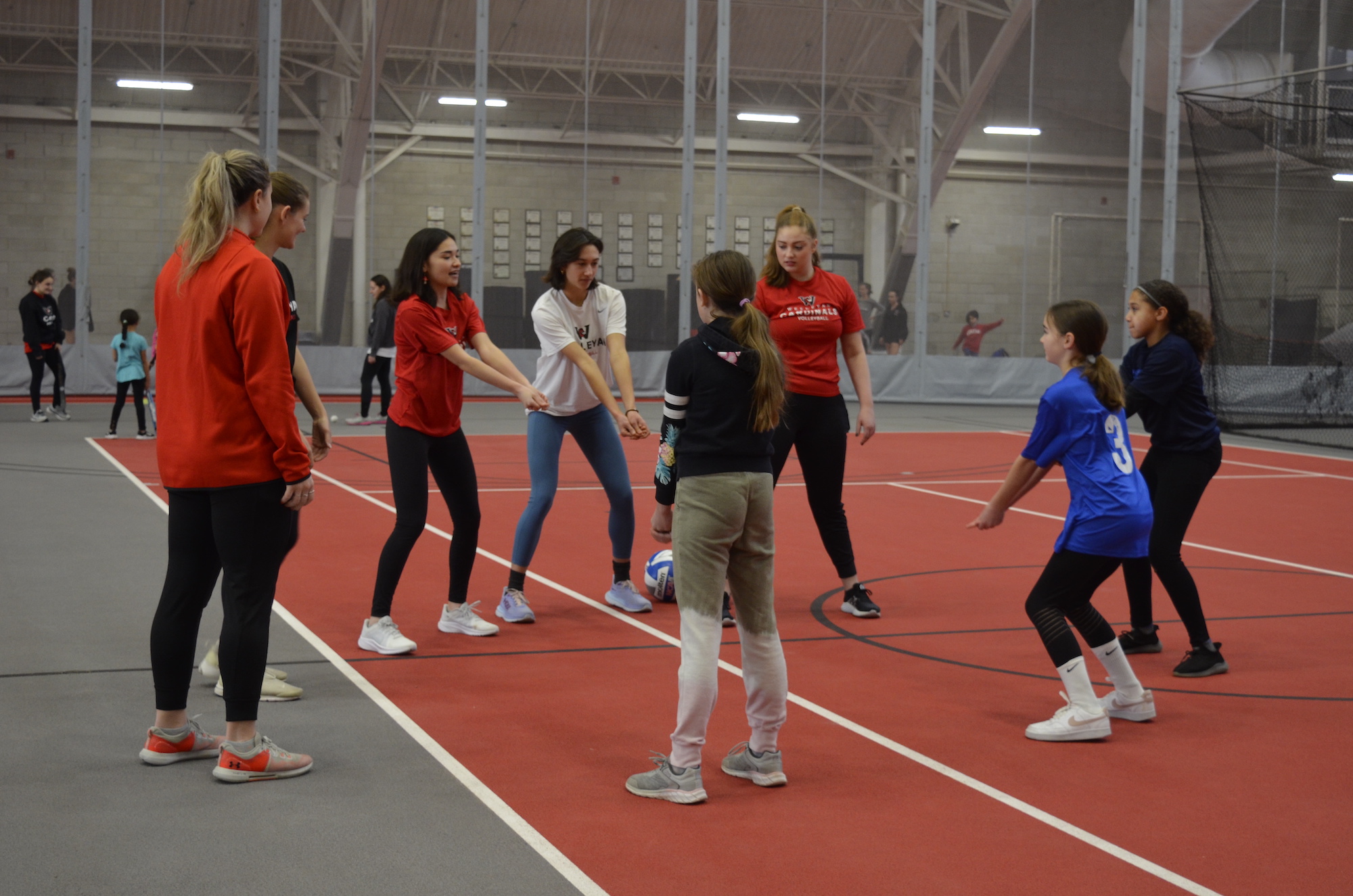
c/o Alexis Campbell
On Sunday, Feb. 5, Wesleyan Athletics hosted a free clinic in honor of National Girls and Women in Sports Day for the first time in three years. It joined universities and high schools across the country in holding events to honor the importance of girls and women in athletics.
The organizer of the event, Head Coach of Softball Jen Lane, explained that Wesleyan first began hosting their National Girls and Women in Sports Day clinic in 2016 and since then, the event has steadily gained popularity.
“When we started in 2016 we had 25 or 30 girls come,” Lane said. “When we did it in 2020, we had about 125 [participants].”
However, due to the COVID-19 pandemic, University guidelines prevented the event from taking place in 2021 and 2022. As restrictions loosened and the campus became more open to visitors, the clinic made a triumphant return in 2023.
“COVID took away so much from everyone and sports does seem like a minimal loss in the grand scheme of things,” Wesleyan softball team member Alexis Campbell ’22 MA ’23 said. “But it really [was] a super sweet moment to get back all together and share why we love the sports that we play and be able to pass on our love for the game.”
This year, around 90 girls from kindergarten through sixth grade from Middletown and the surrounding area participated in the clinic.
Student athletes from eight female-dominated Wesleyan sports teams—women’s soccer, crew, tennis, lacrosse, track and field (for the first time ever), field hockey, volleyball, and softball—helped run the event, which consisted of 12-minute stations focused around each sport. The girls, who were divided into groups by grade, had the chance to visit each station and try out every sport. Afterward, everyone gathered for a pizza party.
Head Coach of Women’s Crew Pat Tynan, father to 10-year-old Alice who participated in the clinic, highlighted how the event was a true learning experience for all parties involved.
“I asked [Alice] what her favorite station was, and she [was] like, ‘all of them,’” Tynan said. “I think it’s great for these kids to get some coaching or interaction with the Wesleyan students. But I think it’s as valuable for the student athletes as it is for the kids because the student athletes get a chance to coach their sport. How can they simplify it down so a 10-year-old can get it?”
Campbell also noted that the event offered a unique opportunity to provide mentorship for the next generation of young female athletes, which she sees as vital.
“Getting your girls into sports is super important to me,” Campbell said. “When I was younger a lot of the times the coaches were parents. There were a lot of dad coaches. So, the first time I had one of the high schoolers come out and help me during my rec program, it made me really love the sport of softball.”
This year is particularly notable regarding the history of girls and women in sports because it marks the 50th anniversary of Title IX, a federal civil rights law that bans discrimination based on sex in education programs or activities that receive federal financial assistance. This law has resulted in a major increase in girls’ participation in school sports programs. Thus, the National Girls and Women in Sports Day clinic provided an excellent opportunity to highlight the substantial progress that has been made to empower female athletes.
Nevertheless, there is still much left to be done, as Campbell explained.
“Even though we talk about the celebration of the 50th year of Title IX, girls aren’t always given the same expectations within sports,” Campbell said. “And being able to see a women-dominated sports team having success and being passionate about it is super important because that’s not an opportunity all girls get.”
Lane echoed Campbell’s sentiment and added that while much has changed, further progress needs to be made on both a cultural and institutional level.
“Girls and women definitely have more opportunities to participate in sports, but they still don’t get the same recognition sometimes,” Lane said. “I think the top programs do but, some mid- [and] low-level programs aren’t getting the same recognition or are fighting for funding. I think Wesleyan does a pretty good job of making sure things are fairly equal [but] there’s always work that can be done.”
A large part of this work requires investing in local communities and inspiring the next generation of budding female athletes to take part in sports. This is something that the Girls and Women in Sports Day clinic aims to facilitate.
“It’s a great Wesleyan/Middletown connection,” Tynan said. “Other faculty and staff members at Wesleyan who have kids this age are there. So it’s a great intermingling of lots of people in the field house, watching their kids play. It’s awesome.”
Erin Byerly can be reached at ebyerly@wesleyan.edu.
Audrey Nelson can be reached at aanelson@wesleyan.edu.